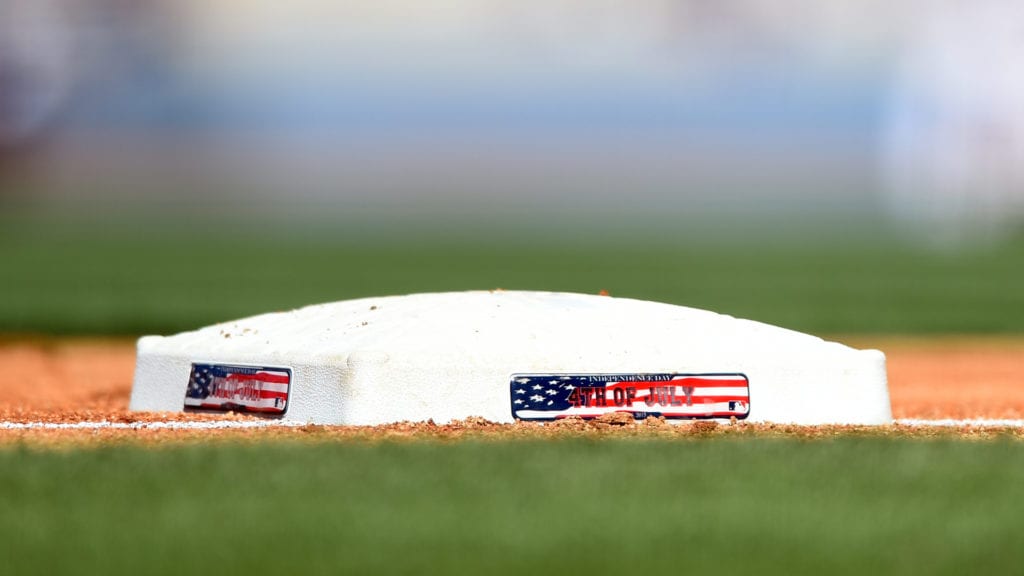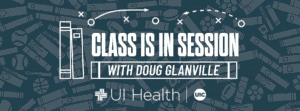Baseball is a great example of America, offers hope for future of our nation
Every year on July 4th, I am reminded of how much I associate the spirit of our Independence Day with baseball. I began playing baseball at a young age as my older brother brought me out to play morning, noon and night.
By the time my Major League career came to a close, I stood for thousands of anthems from Puerto Rico to Seattle, Washington. Not to mention, the many anthems when we played in Canada. The anthem was woven into the routine of playing a baseball game.
In my early minor league days while in my early 20s, I recall one game when I was in A-ball and playing for Winston-Salem. My coach wanted to motivate me, and during my typical stretch time down the right field line, he dove into a lecture on my future. I never did get a chance to warm up, but when the anthem came on the loudspeaker, we instinctively stopped and faced the flag. Given I was the leadoff hitter for the visiting team, I should have been near home plate because once the anthem stopped, the umpire would be looking for the hitter. I had to run in, get my helmet and bat, and rush to hit.
I understood that in its original form, I was not part of Francis Scott Key’s vision. That the color of my skin was a disqualifier for freedom at the time. Despite not being part of this expression of freedom, I realized it still could serve as an aspirational destination where freedom could one day be reached for all.
My parents named me Douglas after Frederick Douglass who was outspoken and part of slightly turning Lincoln’s head toward making a moral argument against slavery instead of just a practical one to unify the nation after the Civil War. Douglass powerfully questioned July 4th and its meaning to the enslaved and their descendants in the time when the country was balancing the liberation of slaves and what a new America would embrace.
My perspective on patriotism was also shaped by my parents with my mom born while the claws of the Jim Crow South were still deeply strangling Black America, and my father was seeking new opportunity outside of his homeland of Trinidad and Tobago. My father was a first generation immigrant,, and his arrival to America was so he could attend Howard University on an academic scholarship in 1956 as a 31 year old freshman student.
Speaking of students, I learned baseball from my older brother who introduced me to sports at an early age, and I became his protege through his experimentation of different sports. I latched on to baseball the most, as I loved the data, the daily chess game of its strategy, and the mix of one on one and team versus team.
Since my dad played cricket in the West Indies, baseball was new to him and something my brother and mother picked up along the way. It became an American culture translator of sorts, helping introduce America through our National Pastime. It was evident it was more than a game to Black communities as my mother was 10 when Jackie Robinson broke the color line in baseball and my father was just beginning his professional career in Trinidad as a 21 year old educator.
With Robinson, baseball’s color line was an international one, so when he had spring training in 1947 in Havana, Cuba, those of darker complexion saw Robinson as opening up doors for them too. Given baseball was the first major American institution to integrate, it became an example of possibility shaping a mindset that they could achieve anything, especially since many of my mom’s aunts and uncles migrated to Philadelphia as they left North Carolina. My father, meanwhile, had grown up in a society that was not only Black, but was led by people of color without barrier, which helped anchor my parents’ partnership in a blend of overcoming, but also becoming what you have already seen is possible.
Although Philadelphia was unkind to Robinson, further isolating my great aunts’ and uncles’ fandom, they still loved the game and Robinson, so when I broke into the big leagues and was traded to Philadelphia, my local family forgave the team and offered their support again. That was in 1998, more than 30 years after Robinson retired, which was also when the Phillies had their first Black player (John Kennedy).

Many relationships forged through the game were ones I would never have had without the game. Not only because of the international diversity of people and the variety of perspectives, but also because of the intimate exposure to various professions. I became close to my hometown police department in part because of all of the summers coached by a volunteer police officer, Gene O’Reilly. Many of my teammates have gone into law enforcement over the past three decades.
I also was in the midst of my career when 9/11 hit home. Growing up right outside of New York City and watching that horror unfold stays with me. I also think about what baseball meant in those moments as we were just weeks away from the end of the season. I was with the Phillies, and we were in a big series against the Braves. Everything stopped, but after a week, baseball resumed with a new sense of what the game means to our nation. It was a healer in those moments, and I was proud to be part of it.
As a man of color, my experience with race shapes what I find to be my treasure in baseball. To this day, I work in and around the game, and I see it as a decoder for our country. The great and the ugly. A game to which you must recommit every day and push it to be a more perfect union. I have had my share of frustrations because of how far we need to go to be truly inclusive. Despite my thousands of anthems standing near the left or right field lines, as Kaepernick kneeled, I understood his pain. I understood that our 1st Amendment is the soul of our country, granting us a unique power to challenge our country, to challenge us without violence. That is our right, and the 1st Amendment is framed in the negative to prevent government from trampling on those rights, implying that we have them as part of us. All of us.
Recently, America decided to make Juneteenth a national holiday. The day slavery official ended everywhere in our nation. It is the ultimate statement of independence, not just for a nation, but for all of us as individuals. We must remember that even the 13th amendment that ended slavery left room for it to exist for the punishment of a crime which, shortly after its passage, was used as a way to arrest and detain Black people with impunity. We still feel the effects of it today, through the stories like Tulsa and in the challenges the evolution of policing faces to this day.
But I still have hope, and part of my hope has been because of how much I loved baseball and the way it is a game that crescendos after small victories and patient battles. You cannot rush, you must wait, and be humbled to excel. It is a great example of America and the chessboard of how we try to find our way forward. I am the descendant of slaves, and I am amazed that I am somehow breathing and here today. My challenge to our nation is one of pushing it to be better for everyone, to not fear our history, but have it help us to shape our future, just as a team never gives up until that final out is recorded. There is magic even in the low percentage plays. Just as when Robinson walked onto the big league baseball field for the first time. A descendant of slaves coming from the Negro leagues, a place that had already told him he was great and beautiful.
This year, I celebrate July 4th with a greater sense of what freedom means and the gifts and responsibility that come with protecting it. And when my hope is challenged, when I sigh wondering if we will ever be able to be one team, I often look to the diamond.
“Class is in Session with Doug Glanville” airs monthly on Marquee Sports Network.



